|
|
|
Sort Order |
|
|
|
Items / Page
|
|
|
|
|
|
|
| Srl | Item |
| 1 |
ID:
124282
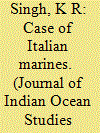

|
|
|
|
|
| Publication |
2013.
|
| Summary/Abstract |
Maritime security in India is hampered more by lack of appropriate legal norms and accompanying structure of sea governance than by inadequacy of enforcement capabilities. That was revealed when Indian maritime enforcement agencies had intercepted MV Alondra Rainbownear west coast in November 1999 and brought the pirated Vessel and persons on board for trail to Mumbai.
|
|
|
|
|
|
|
|
|
|
|
|
|
|
|
|
| 2 |
ID:
140858
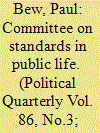

|
|
|
|
|
| Summary/Abstract |
In his recent memoir, William Waldegrave wrote that no country run by John Major and Robin Butler was likely to be in much danger of systemic corruption. The fact remains that a quarter of a century ago, John Major, with the guidance and support of his cabinet secretary, decided to establish the Committee on Standards in Public Life under the chairmanship of Lord Nolan. The apparent prevalence of ‘sleaze’ issues in public life—most notably the ‘cash for questions’ scandals involving Tory MPs—provoked the decision. Lord Nolan's committee immediately enunciated seven principles of public life: honesty, accountability, integrity, selflessness, openness, opportunity and leadership. Over the years, many of the Committee's recommendations have been accepted. There is today vastly greater transparency. The principles have been widely accepted; it is clear the public expects that they should be observed by public servants, including, perhaps especially, MPs. Yet it is equally clear that there is a widespread and still deepening mood of public cynicism on standards matters. The Committee is determined to defend the Nolan principles, but without more help from the political class it will be like Mrs Nupkins in The Pickwick Papers: inculcating moral lessons of great importance and generally ignored.
|
|
|
|
|
|
|
|
|
|
|
|
|
|
|
|
| 3 |
ID:
168255
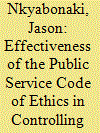

|
|
|
|
|
| Summary/Abstract |
Ethical values are core elements towards efficiency and effectiveness of the public service. Tanzania adopted the public service code of ethics as a behaviour guiding tool to public servants against maladministration practices. The study intended to measure the effectiveness of the public service ethics code as a tool to promote good governance for effective delivery of public service. The study qualitatively analysed the status of how an ethics code may control corruption in the public service. The findings from Toangoma Ward in a study conducted from June to September, 2017 revealed that the principles of a public ethos are not adhered to due to the ecology of public sector that includes, under pay, weak monitoring and evaluation of performance and the culture of nepotism in the public sector. Therefore, these weaknesses have made the public service ethos to be a myth and a failure in the management and provision of social services in Tanzania. The persistence of corruption in the service sectors has continued to ruin and damage the quality of services. The study recommends that the public sector is to be overhauled in terms of promoting best practices such as good pay, meritocracy in recruitment and promotions to higher managerial positions.
|
|
|
|
|
|
|
|
|
|
|
|
|
|
|
|
| 4 |
ID:
151364


|
|
|
| 5 |
ID:
139264
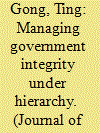

|
|
|
|
|
| Summary/Abstract |
In contrast to the early campaign style anti-corruption strategy based on nationwide uniformity, disparate local integrity initiatives and programs have proliferated in China in recent years. Local innovation in managing government integrity has been encouraged by the Center. Drawing on the author's fieldwork in Guangdong, this article investigates the rationale behind such development and addresses the question of why the central leadership has become receptive to local initiatives in cadre management, an area where political conformity was deemed necessary by an authoritarian regime. It suggests that the strategic adjustment testifies to the institutional failure of the earlier anti-corruption regime that manifested in, inter alia, an acute agency loss problem. The emerging approach to integrity management nevertheless has paradoxical institutional roots. It indicates some new thinking by the central authorities on holding local governments responsible for integrity management. Just as clearly, the adjustment is also driven by the Center's concern about losing control and its desire to ‘manage’ government integrity under hierarchy.
|
|
|
|
|
|
|
|
|
|
|
|
|
|
|
|
| 6 |
ID:
124817
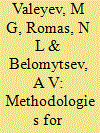

|
|
|
|
|
| Publication |
2013.
|
| Summary/Abstract |
The authors set out their broad idea of "form of military (combat) actions" as a category, its substance and significance for the theory and practice of military art and weapons development, and offer their methodology for defining forms in which troops are employed in different conditions.
|
|
|
|
|
|
|
|
|
|
|
|
|
|
|
|
| 7 |
ID:
120734
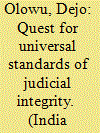

|
|
|
|
|
| Publication |
2013.
|
| Summary/Abstract |
While the Bangalore Principles of Judicial Conduct, 2002, are not binding on states, they evidence high-level support for the principle of judicial integrity. In addition, superior courts and judiciaries of diverse legal traditions have relied on the Bangalore Principles in codifying their minimum standards of judicial integrity. Extrapolating from some of the core values of the Bangalore Principles, this article accentuates some of the critical challenges implicated in establishing credible, independent and accountable judiciaries. Beyond the task of developing appropriate mechanisms for ensuring judicial integrity, this article assesses the follow-up efforts to the Bangalore Principles, such as the draft Lusaka Measures on the Implementation of the Bangalore Principles on Judicial Conduct, 2010, contending that while these measures seek to quantify the critical elements of the Bangalore Principles, there are still areas of concern. This article addresses a plethora of pertinent questions, advocating that the mechanisms for judicial integrity should not be entirely controlled by the judiciary but be made to accommodate sufficient lay representation, and furthermore, that current codes of judicial conduct be formulated as enforceable rules and procedures in ways that would sustain public confidence in judicial processes.
|
|
|
|
|
|
|
|
|
|
|
|
|
|
|
|
| 8 |
ID:
115213
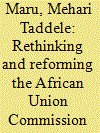

|
|
|
|
|
| Publication |
2012.
|
| Summary/Abstract |
Recently, in July 2012, the high-profile and bitterly fought nine-month race for the post of Chair of the African Union (AU) Commission, between Dr Jean Ping of Gabon, and his main challenger, Dr Nkosazana Dlamini-Zuma, culminated in the latter's victory. Her victory came after the deadlock at the Eighteenth AU Summit in January 2012. Borne out of the considered need for a quick fix through reliance on a vote of expediency, the election of Dr Dlamini-Zuma represented a political resolution to the crisis that arose due to the earlier ongoing electoral deadlock. Far from being a competitive election by design, the 2012 AU Commission election by default became transformed into an intensely fought campaign that put the AU in the limelight. This article briefly introduces the electoral process, explains in detail the voting behaviour of AU member states, and offers five specific reasons for the victory of Dr Dlamini-Zuma. On the surface the election looks very competitive, but the article explains why this is not the case. To create greater competition for these posts, the AU needs to overhaul the nomination process and the voting procedure. In this regard, the article proffers detailed analysis and proposes a radical revision of the existing criteria for the nomination. The article also proposes specific recommendations for the amendment of the rules of procedure of the AU Assembly to allow for a qualified majority as a deadlock breaker in the fifth round. It also assesses whether the integrity of the AU Commission election was damaged during the campaigning and voting process. In this regard, it recommends the development of a code of conduct for future elections at the AU.
|
|
|
|
|
|
|
|
|
|
|
|
|
|
|
|
| 9 |
ID:
092123


|
|
|
|
|
| Publication |
2009.
|
| Summary/Abstract |
Violence is one of the most important causes of suffering and death on the planet. The incidence of different forms of violence varies markedly within and between populations with high rates of violence driven largely by poverty and social injustice and sustained by inept policy responses rooted in legal and moral frameworks. Violence therefore poses a major challenge for public health which is the discipline concerned with assuring the conditions for a healthy society. Over the past five decades it has become increasingly clear that public health has important contributions to make to the challenge of understanding and preventing violence, contributions which extend and complement conventional legal and moral approaches to violence. This work was led initially by the US Centre for Disease Control (CDC) and more recently by the World Health Organisation (WHO) which in 2002 published the first World Report on Violence and Health. Public health is a relatively atheoretical discipline. While a number of useful theoretical frameworks have emerged to better understand and prevent violence, there is no agreed or dominant public health theory of violence. James Gilligan has proposed a detailed and potentially useful public health theory of violence based on the notion that shame/humiliation, which violates an individual's self-respect and dignity, is the pathogen that causes violence; a pathogen intimately linked with cruelty and neglect in childhood, spread by the vector of inequalities in power, wealth and status in society and sustained by punishment and humiliation within the criminal justice system. This notion of violence resonates with Vittorio Bufacchi's concept of violence as a violation of integrity.
|
|
|
|
|
|
|
|
|
|
|
|
|
|
|
|
|
|
|
|
|